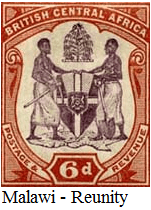
The name Malawi comes from the Maravi, an old name of the Nyanja people that first inhabited the area.
 European exploration of Africa increased towards the end of the 19th century, and the British established the protectorate of Nyasaland in 1891.
European exploration of Africa increased towards the end of the 19th century, and the British established the protectorate of Nyasaland in 1891.
The desire for independence grew when Nyasaland joined with Northern and Southern Rhodesia in 1953. On July 6, 1964, Nyasaland became independent from British colonial rule and quickly renamed itself Malawi.
Over a span of nearly 30 years, President Hastings Kamuzu Banda ruled firmly, suppressing opposition to his party and ensuring that he had no personal opposition.
 On the very positive side, while Banda was president this poor, landlocked country achieved progress in both agriculture and industrial development.
On the very positive side, while Banda was president this poor, landlocked country achieved progress in both agriculture and industrial development.
After three decades of one-party rule, the country held multiparty elections in 1994, under a provisional constitution which came into effect the following year.
 President Mutharika was elected in May 2004 to oversee one of the world’s least developed and most densely populated countries.
President Mutharika was elected in May 2004 to oversee one of the world’s least developed and most densely populated countries.
His job was daunting as Malawi has a low life expectancy and a high infant morality rate. There is also a high prevalence of HIV/AIDS.
President Mutharika’s image increasingly grew to one of autocratic nature and that of being dismissive of human rights. Protests sparked in July 2011, over the high cost of living and poor governance.
President Mutharika died of a heart attack in April 2012, and former Vice President Joyce Banda took over.
As the country’s newest leader, Banda is faced with the task of restoring diplomatic ties with aid donors that were broken during Mutharika’s reign, as well as strengthening relations with Malawi’s immediate neighboring countries of Mozambique and Zambia.